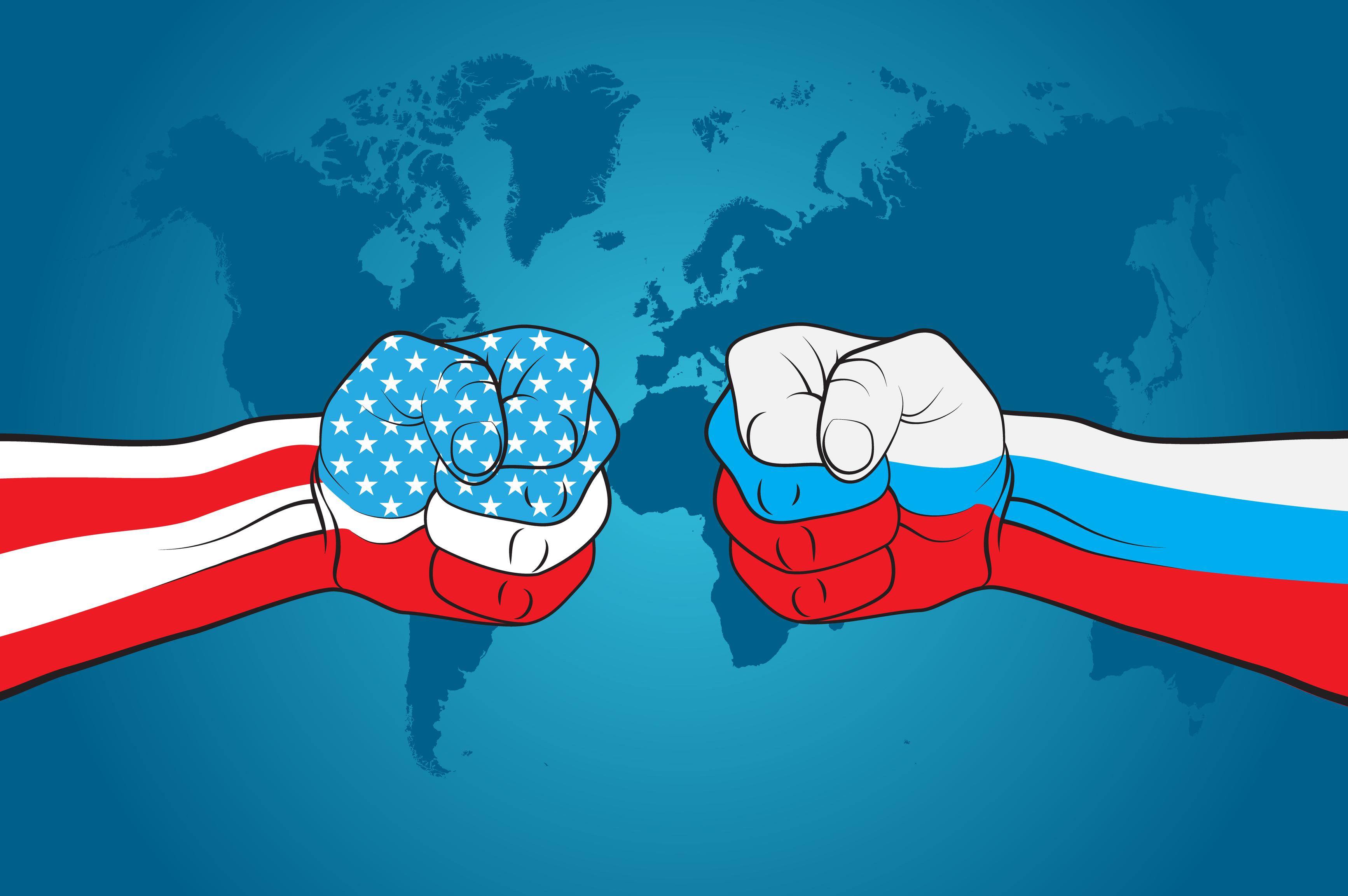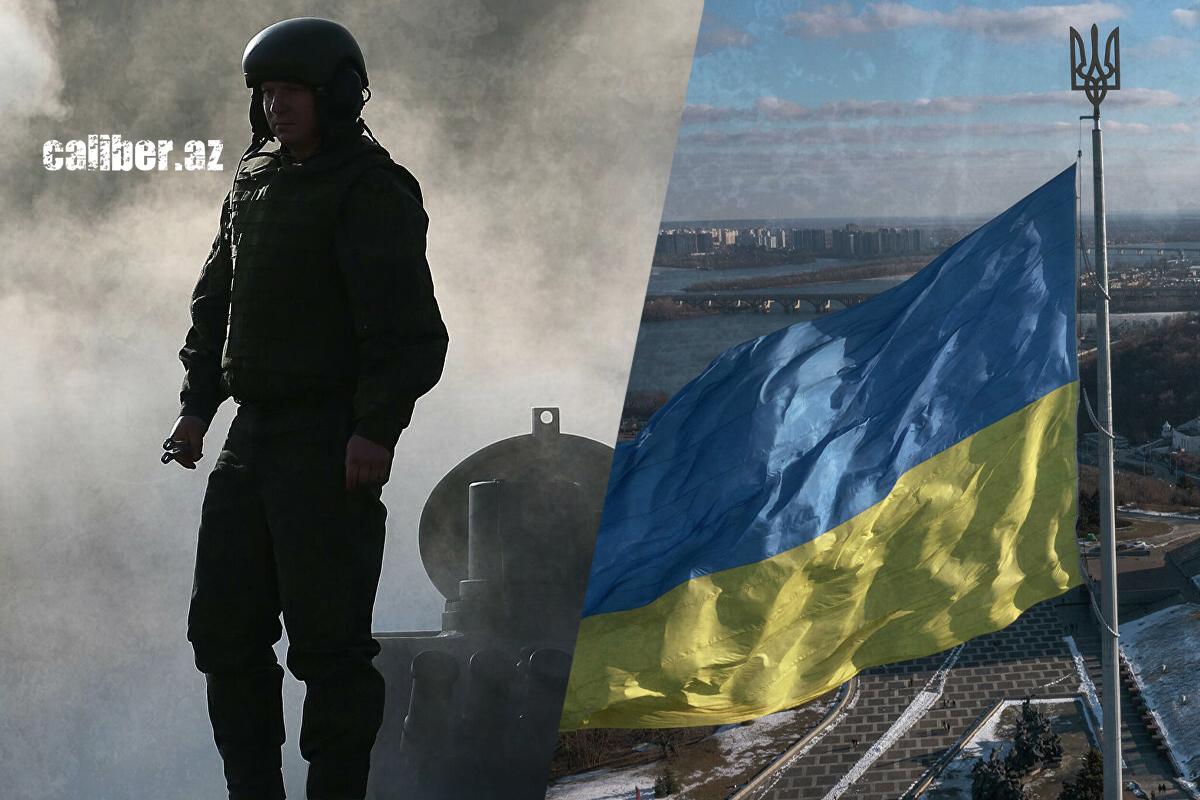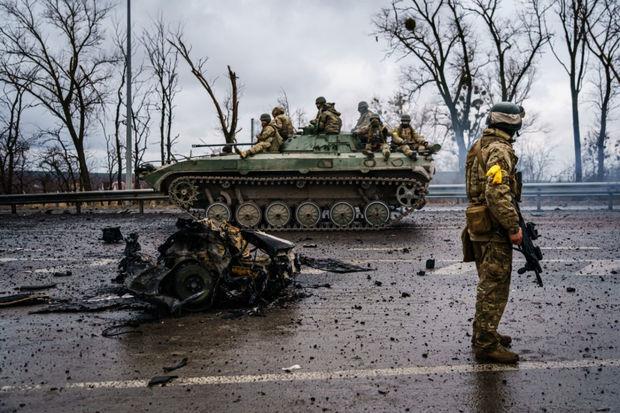Russia-Ukraine-West: Tendencies of world war already noticeable Review by Serhey Bohdan
The Russian-Ukrainian war has been going on for more than three months. Moscow continues operations despite Western sanctions. On Saturday [May 28], the leaders of France and Germany talked for almost an hour and a half with their Russian counterparts on the phone, discussing the possibility of a diplomatic solution. The invasion did not become a blitzkrieg for Putin, but militarily Ukraine is in a difficult situation.
The war or power redistribution within NATO
If we talk about the results of three months of the war, the figures are inexorable: before February Moscow controlled 7 per cent of the Ukrainian territory, now it is already 20 per cent. It is not surprising that last week in Davos, Ukrainian Foreign Minister Dmytro Kuleba said: "I don't want anyone to get the impression that everything is more or less in order with the war. The situation in Donbas is extremely bad."
On the one hand, the West defiantly supports Kyiv. Western media avoid critical materials about the state of affairs in Ukraine, and even scandalous cases of gross mistakes by the Ukrainian authorities are consistently blurred. As a result, sometimes it may seem that the West blindly believes in Ukraine and will soon give it a lot of weapons to win the war. But this is not quite true. Loud political statements and steps of the Western establishment in connection with the Russian-Ukrainian war sometimes have a "double bottom". First, we should not forget that there are a lot of intra-Western political squabbles at various levels around Ukraine, which often have little to do with Ukraine at all. Some showdowns are smaller: here, the German "greens", inspired by their electoral successes after many years "in the cold", are trying to use a couple of newly acquired ministerial portfolios, primarily the Foreign Ministry, in order to pave their way to the coveted chancellor's chair on a wave of military enthusiasm.
Others are clearly larger - for example, the struggle for a reshuffle of forces within NATO, its shift to the east with Poland coming to the fore in alliance with Great Britain, which is fraught with a reduction in the role of major Western European countries (and a rebound - Turkiye). It is in this vein that the seemingly principled position of London and Warsaw regarding the Russian-Ukrainian war should be considered. Last Thursday, British Foreign Secretary Liz Truss said that "Russia's aggression cannot be appeased, it must be repelled by force", and Ukraine can defeat Russia if the West increases military assistance to Kyiv and sanctions against Moscow, because "we cannot now take our foot off the gas pedal".
A day earlier, Polish President Duda called on his Ukrainian counterpart to fight uncompromisingly until complete victory.
In fact, reading between the lines of the speeches of a number of current and former high-ranking military and civilian officials of NATO countries, one can notice scepticism about the outcome of the war, and we will talk about this below. Scepticism is increasingly spilling out into open areas. Back on May 19, one of the key newspapers of the Western world, the New York Times, published an editorial column in which it called on Kyiv to take a more realistic approach, saying that "it is not in the American interests to get involved in a full-scale war with Russia", and "peace achieved through negotiations may require Ukraine to take difficult decisions" in relation to certain territories. Moreover, "the population's support for the war far from the shores of the United States will not last indefinitely. Inflation is a much bigger problem for American voters than Ukraine, and meanwhile, the problems in the global food and energy markets are likely to only get worse." The newspaper believes that "it would be dangerous to think", based on UKraine's success in repelling the invasion, that Ukraine, with Western help, will be able to push back Russian troops to positions as of February 24, not to mention Kyiv's return of control over the territories over which control was lost in 2014.

To appreciate the full flavour of this comment, it is worth remembering that earlier US President Biden used to say that Putin "cannot remain in power", US Defence Secretary Lloyd Austin insisted that Russia should be "weakened", and the speaker of the lower house of the US parliament Nancy Pelosi proclaimed that the US would support Ukraine "until victory will be won".
And, by the way, this opinion of the New York Times, as the mouthpiece of the American establishment, is interestingly layered with information from the authoritative European online magazine Politico, which, citing its sources, reported last week that the leaders of France, Germany and Italy are opposed to Ukraine's orientation to a certain decisive victory over Moscow and they advocate the need for a peace agreement. However, German Chancellor Olaf Scholz did not hide this, saying recently that "Ukraine should not lose the war", that is, it is not about victory, but about the fact that an outright collapse cannot be allowed.
There are other, more subtle signs indicating a search for compromises. On Sunday [May 29], it became known that the Russian Federation and the United States are discussing the resumption of mutual inspections on START-3. Given the extremely sensitive nature of nuclear weapons issues, this speaks volumes. The nuclear powers are still looking for a way out of the situation of acute global confrontation, in which Ukraine has become only one of the platforms for finding out "who is stronger".
Waiting for weapons
The search for compromises will depend on the actual layout of the battlefields. And sometimes heroism is not enough there. According to Ukrainian Foreign Minister Kuleba, the main problem in his country is that the Russian army surpasses the Ukrainian Armed Forces in heavy weapons. And first of all, Kyiv needs artillery and MLRS [Multiple Launch Rocket Systems]. Literally immediately, on Saturday, it became known that the United States would supply Ukraine with modern MLRS.
The former commander of the NATO forces, Hans-Lothar Domrese, believes that in fact there is no catastrophe in military terms, Kyiv just needs to endure a losing streak for now. But in the autumn it will be possible to introduce a significant mass of weapons received and mastered by that time, and the situation will begin to change. Aleksey Arestovich, who is a member of the administration of the Ukrainian president, believes that the situation will begin to improve in a month and a half, as soon as help from the United States arrives.
However, this rhetoric looks ambiguous and even dangerous, since it supposedly calms down Kyiv's constant loss of control over the country's territory and the loosening of defence structures "brick by brick". After all, the most complex social structures like modern armies and states in war conditions do not fight to the last soldier, man and the last inch of the earth. They collapse after a critical component of their constituents is knocked out. Let us recall, for example, not only the collapse of Germany in 1918 or 1945 but also, for example, the collapse of the Polish state in 1939 - everywhere the collapse occurred in a situation when the respective governments still had many hundreds of thousands of soldiers under arms who controlled vast territories. Therefore, it is extremely dangerous to turn a blind eye to the current digressions.

Can Ukraine win?
But even if Kyiv withstands the whole "summer of losses and retreats", will the weapons that arrived by that time help him much? As another NATO general, Egon Rams, noted, every square kilometre surrendered to the enemy will have to be won back, and even with Western weapons, it will be difficult to do this, it will be too difficult to achieve the necessary superiority in strength and equipment, especially considering that the war is going on next to the Russian Federation, from which additional forces can always be transferred. Therefore, he says, it is necessary to minimise the territorial achievements of the Russian army so that Kyiv generally has a realistic chance to win them back.
And there may be many more retreats, because, according to Rams, the Russian army is not spending its last forces at all. What is usually presented as proof - Russian military units on the T-62, in his opinion, is not at all. Firstly, equipment like the T-62, of course, is not new (however, Western armies are full of similar "old age" types of weapons), but it is not at all helpless on the battlefield. Secondly, this only shows that Moscow avoids using units from its Western Military District (ZVO), which are equipped with new equipment, in operations. Therefore, units from the Southern Military District are going into business, and then the units of the Eastern Military District will probably go into business, also not with the best weapons, but they are still saving for the western borders. In other words, the Kremlin is not on its last legs, and this will eventually become clear to everyone, just as the fallacy of the forecast about the imminent end of Putin's stocks of modern missiles became clear - they both flew and fly.
The same applies to human resources. Yes, at the weekend Putin signed laws on raising the age of service and extending contracts. But this is the case in conditions when mobilisation is not carried out at all. Even the few known figures of losses of the Russian army are impressive, but it still does without mobilisation. In general, Putin still has something and whom to send into battle.
Against this background, the retired NATO military is calling for caution regarding the reserves available to Kyiv. There were statements from the Ukrainian side that Ukraine would be able to put up to 900,000 bayonets, and judging by the flow of Ukrainian refugees, among whom there are very few men of military age, Kyiv is really successfully working on this and suppressing attempts to avoid mobilisation. But even so, Western experts say that in reality, the maximum is 400,000.
In other words, Kyiv has a limited number of people, and therefore in the West, they look with alarm at how they are commanded or, as the NATO generals put it, at the quality of "management at the tactical and operational level", repeating over and over again: boilers cannot be allowed and it is urgently necessary to withdraw from Severodonetsk that brigade or two that Mariupol and Azovstal are located there, and not to repeat there (despite the fact that there were already sad stories before - Donetsk airport and Ilovaysk - beautiful patriotic stories, dubious from the point of view of military skill). However, there may really be a special reason for the story with Mariupol and Azov: Kyiv thus got rid of a problematic unit, the legacy of the era of volunteer battalions, impossibly politicised and stuffed with extreme radicals, capable of arranging anything even against the Ukrainian government itself.
The situation with the supply of weapons to Ukraine also looks difficult. As the DPA news agency reported on Wednesday, there is an informal agreement within NATO not to supply certain types of weapons to Ukraine, including tanks and planes, since Russia may regard this as participation in the war. As explained by the DPA with reference to diplomatic sources, the countries are still adhering to these agreements, fearing that otherwise, in the event of a collision with Russia, they will not receive the full support of the alliance. That is why Poland has not delivered the MiG-29 to Ukraine, the possibility of transferring which was discussed more than two months ago. Israel, for the same reasons, banned the transfer of Spike ATGM manufactured in Germany under an Israeli license to Ukraine, and the German government has so far publicly agreed to supply Ukraine with only two types of heavy weapons - the ZSU Cheetah and the Panzerhaubitzen 2000 self-propelled gun (155mm howitzers), although Kyiv also requires the supply of tanks and infantry fighting vehicles.

Spirit and material support
In assessing the combat capabilities of Kyiv, an important but poorly measurable concept is often abused - morale. They say everything is hard, but the fighting spirit of Ukrainians changes the whole layout on the battlefield because it is higher than that of Russians. There are no objective reasons to think so, for every video with the Regardie refusing to fight, it is not difficult to find a similar video with tortured Ukrainian soldiers telling about the mess and refusing to die for the stupidity of the authorities, etc.
A favourite argument of supporters of the theory of higher morale of the Ukrainian army: they say, look what happened near Kyiv. They thought they would surround him and take him, but it wasn't there! Therefore, do not worry now - Putin will break his teeth both in the east and in the south of Ukraine. It sounds beautiful, but it's not clear that then Kherson and Mariupol could not resist the same way as Kyiv and Chernihiv?
Instead of a metaphysical explanation, there is another one, it is simpler and verifiable. It's all about logistics, logistics and the possibility of providing troops. Putin has moved troops into Ukraine from the north (i.e. "to Kyiv"), the east and the south. So, where his troops were advancing from the territories (or water areas) where they had been operating since 2014 and where the entire infrastructure was built, they achieved results there. With such a rear, it is not without problems, but Russian troops have dug into the territory of Ukraine in the east and southeast.
Things were already more complicated in the southwest (Mykolaiv-Odesa), where Romania was on the one hand and the sea on the other. And it turned out to be absolutely rubbish with the northern direction. After all, the Russian army was fully able to operate on the territory of Belarus only after the destabilisation of the Belarusian state there as a result of the events related to the 2020 elections. Moreover, Minsk itself demilitarised the areas adjacent to Ukraine throughout the post-Soviet period, decommissioning everything that was military there since Soviet times. Therefore, the Russian group did not have a full-fledged rear there, and Minsk tried to restrict access to the territory itself, not to mention entering into a war against the fraternal people. This circumstance, which explains the failure of the Kyiv operation, is stubbornly silent in the Western and Ukrainian media - after all, Belarus has become a testing ground for demonstrating the democratisation efforts of the West, and therefore the West has nothing but black paint for it.
***
All sides - Ukraine, Russia and the West - will have to make difficult compromises, and these compromises will concern not only the Eastern European region. Otherwise, the continuation of the conflict may lead to a world war and the corresponding trends are already noticeable.
Even in a less gloomy scenario - if it is possible to isolate the hotbed of war on Ukrainian territory - the threat of a protracted conflict still looms on the horizon (with a constant probability of its expansion!). It is quite possible in the era of high-tech armies, the Iran-Iraq war was an example of this (other Arab and Western countries, however, were seriously involved in it). Despite the fact that the Iran-Iraq conflict threatened the most important global sources of oil, and the parties suffered thousands of losses, the massacre dragged on for eight years. The result was undermined prospects for the development of Iran, Iraq and the entire region.
Similar trends threaten Eastern Europe. No neighboring country, including the states of the South Caucasus, will benefit from the appearance of two countries that have exhausted each other in the war - Ukraine and Russia.








